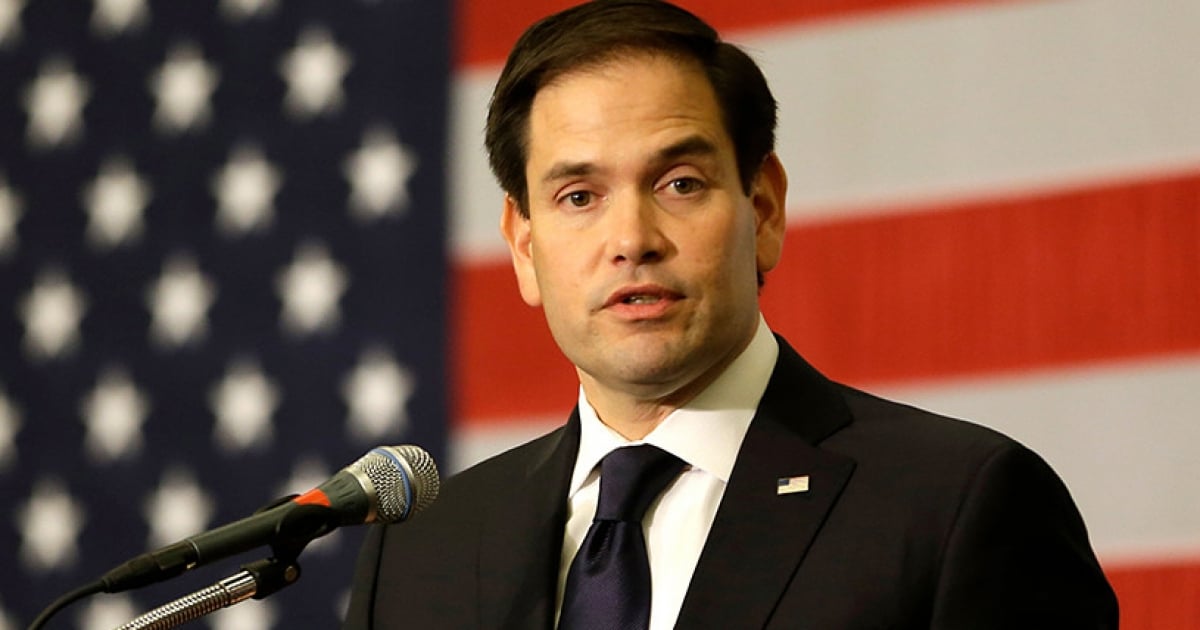
The elected president of the United States, Donald Trump, appointed Senator Marco Rubio as Secretary of State on Wednesday, making him the highest-ranking Latino official in the history of the U.S. government.
In a statement shared on social media, Trump noted that it is "a great honor for me to announce that Senator Marco Rubio from Florida has been nominated to be the Secretary of State of the United States."
Trump described Rubio as "a highly respected leader and a very powerful voice for freedom."
He added that the senator from Florida "will be a strong defender of our nation, a true friend to our allies, and a fearless warrior who will never back down from our adversaries."
"I look forward to working with Marco to make America, and the world, safe and great again," he emphasized.
In recent years, U.S. Senator Marco Rubio has emerged as one of the regime's most vocal critics, repeatedly labeling it a direct threat to the national security of the United States.
Rubio, who comes from a family of Cuban immigrants, has advocated on multiple occasions for regime change in Cuba and has warned about the risks it poses both to the Cuban people and to regional stability.
Before the official appointment, several Cuban-American congress members in the United States, who see Rubio as a key ally in the fight against authoritarian regimes in Latin America, enthusiastically supported Trump's decision.
Before Marco Rubio's appointment as Secretary of State, Trump had already begun to announce the names of those who would be part of his administration, starting on January 20, 2025.
These appointments underscore his intention to reinforce the MAGA ("Make America Great Again") project, one of the cornerstones of his political vision.
Among the announced figures, the appointment of Susie Wiles stands out; she will make history as the first woman to hold the position of Chief of Staff at the White House.
Trump had also announced that Tom Homan, 62, known for his strong stance on immigration, would be the new "border czar."
Furthermore, Trump appointed Stephen Miller as Deputy Director of Policy at the White House, in addition to naming Lee Zeldin as head of the Environmental Protection Agency and Elise Stefanik as the United States Ambassador to the UN.
Republican congressman and retired Green Beret Mike Waltz has been appointed as national security advisor, noted for his critical stance on China; meanwhile, Kristi Noem, the governor of South Dakota, is announced for the position of Secretary of Homeland Security, which would create an important triangle in migration policy.
The statement, released on social media this Wednesday, included a biography of Senator Marco Rubio, which we reproduce below.
Marco Rubio was born in 1971 in Miami, Florida, to two Cuban immigrants pursuing the American Dream. His father worked as a banquet waiter, while his mother took care of the home and was employed in a hotel. From an early age, Rubio learned the importance of faith, family, community, and honest work as a path to a good life.
Rubio was drawn to public service largely through conversations with his grandfather, who witnessed his home on the island being destroyed by communism. After meeting his wife Jeanette—and obtaining degrees from the University of Florida and the University of Miami School of Law—Rubio served as a city commissioner in West Miami and later as the Speaker of the Florida House of Representatives. In 2010, he won a seat in the U.S. Senate.
During his first term, Senator Rubio experienced the stagnation of Washington. Reform efforts faced significant resistance due to partisan extremism and a deep-rooted elitist establishment, both of which benefitted from the status quo. Senator Rubio also witnessed firsthand the communities that had been left behind by this establishment: towns and cities devastated by the loss of decent jobs and eroded by a culture that had forgotten the importance of faith, family, and community.
But those experiences did not discourage Senator Rubio—they only strengthened his determination to revive the American Dream for hardworking Americans. Now, in his third term, he continues to advocate for common-sense policies that create good jobs, strengthen communities, and protect Americans from the Chinese Communist Party.
In addition to providing service to the award-winning constituent, Senator Rubio has enacted hundreds of new laws, including some that are truly transformative. He led the effort to reform the U.S. Department of Veterans Affairs and to provide healthcare benefits to veterans suffering from toxic exposure due to burn pits. He doubled the federal child tax credit for working families. He helped keep millions of small businesses afloat during the pandemic lockdowns through the historic Paycheck Protection Program. Additionally, he secured generous funding for restoration efforts in the Everglades.
Senator Rubio also drafted and passed the Uyghur Forced Labor Prevention Act, which marks the most significant turning point in U.S.-China relations in decades. For these accomplishments and more, the Center for Effective Law consistently ranks Rubio among the three most effective senators in Congress.
Fighting against party stagnation and the complacency of the elite is never easy, but Senator Rubio feels honored to serve his country and the people of Florida. Every day, he wakes up knowing that he has the mission to fight for you and your family in pursuit of the American Dream. He will not leave American politics until it once again focuses on common sense and the common good.
Filed under: